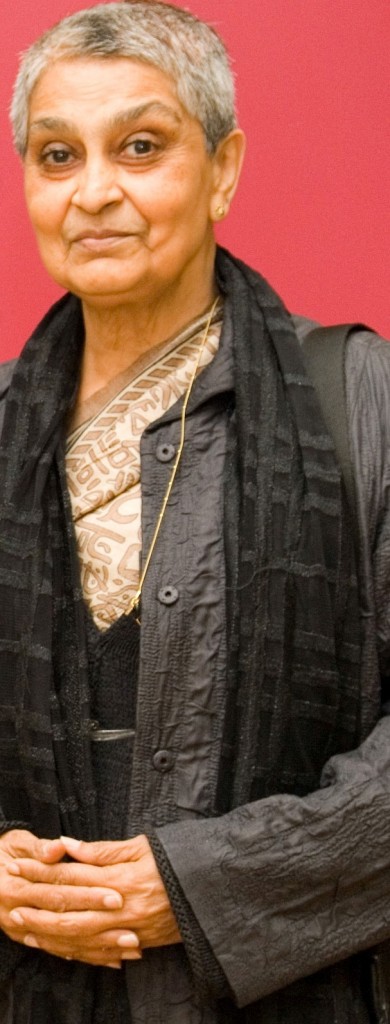Gayatri Chakravorty Spivak, Professor, Columbia University and leading literary critic
 Tribute to the poet from a middle class girl
Tribute to the poet from a middle class girl
On the 150th anniversary of Rabindranath Tagore, I was asked to say a few words about him at Lady Brabourne College in Kolkata.
I segued on to my subject by way of Jayasree Roy Chowdhury, now Jayasree Nath, a school friend from Diocesan, a small girls’ school in Kolkata, who had continued on to Brabourne, a women’s college . For she and I would sit down at a harmonium and sing rabindrasnageets or Tagore-songs on every possible occasion the two years I was at that college (1955-57). bhora thak [“Let it be full” – I should mention that the songs listed here by their opening phrases form a stock of occasional songs for groups and institutions in West Bengal, Tagore’s home state, and will be readily recognized] – at farewells, jibono jakhono [“When life”] at deaths –, nutan juger bhorey [“At the dawning of the new era”] at Independence, morubijoyer [“desert-conquering”] on 25th boishakh (Tagore’s birthday on the Indian calendar), and so on. And I think at the end of the day, in spite of all the grandeur of the poet’s trajectory, it is this intimacy in our girlish souls, established now into examined lives, which “mean” Tagore for us. Always a better articulation of our own feelings, as it were. Even this narrative can be expressed in Tagore language: amar khela jokhon chhilo tomar shoney . . . [“When you were my playmate . . .”]
Not just us, of course. I remember Mother saying her college generation grew up on Shesher Kobita, a slim love-story of deliberate end to an affair, where Tagore takes himself on in the name of a poet of a younger, rebellious generation. This is my Tagore, giving soul-shape to middle class women.
About a week before that event at Lady Brabourne I was in Japan. there is a good deal of Tagore commemoration upon those islands this year. I am neither a Japanologist nor a Tagore specialist, but it is certainly remarkable how Tagore was at every step self-distanced from the Shinpei Goto-style embattled Pan-Asianism of those years. His cosmopolitan critical attitude toward mere nationalism, combined with his love of what he perceived to be the possibility of a humane India, is something we need to remember today.
Rabindranath Tagore’s serious message to the world cannot be ignored. But I am a literary critic, and it is in other crannies of his work that I locate the profundities. A few years ago, at Professor Subodh Chandra Sen Gupta’s centenary celebration, I commented on Tagore’s essay on comparative literature – “Bishho Sahitto” [“World Literature”] – where he theorizes the imaginative creative bond that travels across national boundaries as bajey khoroch – wasteful spending. A powerful metaphor for what in the imagination goes above beyond beneath and short of mere rational choice.
The world is in bad shape with the loss of emphasis on the humanities. This message of Tagore – that what goes across is not immediately profitable — is a hard lesson to learn in the face of the material ambition that at once drives and destroys our lives. I offered no homily, just marked the moment for all the students and teachers of literature in the audience.
Much is debated about Tagore’s relationship to the Bauls, the mendicant minstrels of Bengal. Here too, the poet settles things with a metaphorical light touch. The minstrel goes singing Lalan Fakir’s famous song – khanchar bhitor achin pakhi komney ashey jay [“how does the unknown bird come and go in the cage?”]. The next line describes a longing – tarey dhortey parley monobedi ditem tahar pay [“If I could catch him I’d put mind-shackles on his feet”]. The subject of the longing is also the poet himself. The minstrel passes on outside of the text so that the middle class story of high Hinduism as opposed to true nationalism can begin. This is the first page of Tagore”s novel Gora. Unmediated devotion cannot be captured by the text of modernity. The minstrel must move on.
Amartya Sen has written in the New York Review of Books an excellent article about the difference between Tagore’s diversified genius and his general Western reputation as a somewhat boring “mystic.” Part of this is no doubt due to what my friend the late Edward W. Said would call “orientalism.” But part of it is also due to the sustained tenor of the translations.
Ketaki Kushari then, Ketaki Kushari Dyson today, also a former student of that college, has tried to intervene in this problem, but she has been roundly reprimanded for not being sufficiently worshipful. For this, too, a good Tagore line can be found: Bhalomanush noi rey mora, bhalomanush noi/ Guner modhye oi amader guner modhye oi [“We are not good people, no we’re not good people/ that is our only credit, that alone”] – an excellent place to conclude. I was presiding at the annual prize-giving ceremony at the college My young friends were impatient to receive their well-deserved rewards, to which I added my heartiest congratulations and the warmest wishes for a brilliant future where the lesson of the humanities will not be forgotten.
© Gayatri Chakravorty Spivak Columbia University